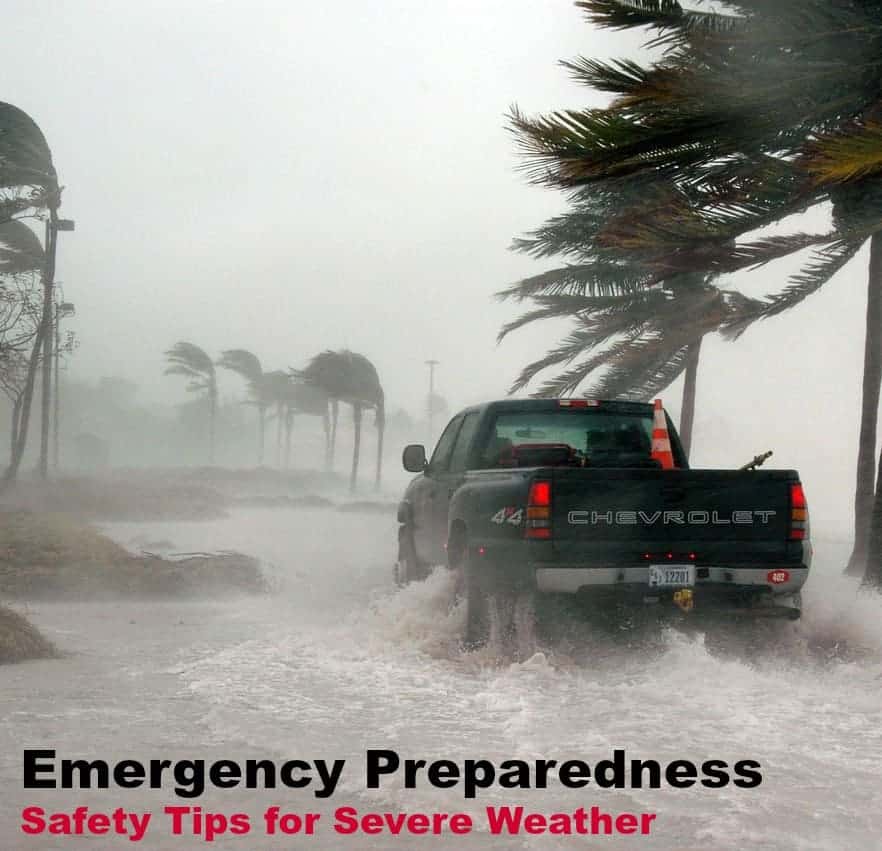Last Updated on October 20, 2022 by Diane Hoffmaster
If you live in an area prone to extreme weather, you really need to familiarize yourself with a few emergency preparedness safety tips.
A few years ago, I was getting dressed very early in the morning when I heard a huge crack at the same time as a bright flash of light illuminated my dark bedroom.
The house practically shook from the rolling of thunder. I hesitated a moment and went to the blinds to glance out my front window. To my horror, the house across the street from me was engulfed in flames!
I froze for a brief second, my mind not really believing what my eyes were seeing. I quickly grabbed the phone and dialed 911 to notify the fire department.
Thankfully, the family made it out safely but not without losing just about everything to smoke, water, and flames. The incident has weighed heavily on my mind ever since.
I am worried about what would happen if such a thing were to ever happen to us. We have had electrical surges from lightning strikes many times over the years and according to the electrical technicians who come out, it is because our neighborhood sits on a giant slab of granite that acts as a lightning rod during storms.
Mother nature is a powerful force and not one that we can conquer. We can, however, learn a few emergency preparedness safety tips so that when or if we DO get hit with a natural disaster we are as ready as we can be.

Severe Weather Emergency Preparedness Safety Tips
If disaster preparedness is something you are concerned about, here are a few simple ways to get started.
- Know what emergencies are most likely to occur in your area. Preparing for a blizzard in Texas would not make sense.
- Have a family disaster plan and practice it. Make sure your children know how to safely evacuate the house and where to meet outside.
- Make a disaster preparedness kit for your family. You should have a stock of items you can use if you shelter in place as well as a bag of supplies you can grab quickly if you have to evacuate. Check out the list of items you should stock in a Bug Out bag from Confessions of an Overworked Mom. Or, take the easier step of buying an Urban Survival Bug Out Bag Emergency Disaster Kit. It has everything you need to prepare for a natural disaster.
- At least one member of the household should be trained in first-aid and/or CPR.
- Keep an inventory of all your possessions including serial numbers for insurance purposes. Make sure you send a copy to someone you trust that does NOT live in your house.
- Keep a list of doctors, medications, pharmacy phone numbers, etc handy in case you need to evacuate and have to leave your medication behind.
- Buy a fire safe and store valuables and important papers in it. Consider sending copies of that paperwork to a close family member or get a safe deposit box.
- Make plans in advance for your pet. Most shelters will not accept pets. Identify a willing friend or find a local vet ahead of time who can help with long-term accommodations if needed. You can also make up an emergency preparedness kit for your pet. Store all the emergency supplies you would need for him or her in a large plastic bin. That way it is easy to grab it on your way out the door.
- Talk to your neighbors about emergency preparedness. Find out who among you has a generator, who has medical training, etc. Disaster preparedness means working together in times of need.
- Review your disaster preparedness plan every 6 months and keep it up to date. Go through a mock evacuation with your children and make sure they remember where to meet and how to act.
If you have ever survived a severe weather incident or natural disaster you know how much damage Mother Nature can cause. The destruction can be overwhelming both financially and emotionally.
It is impossible to know when or if a disaster will occur but following through on some of these emergency preparedness safety tips will make sure you are prepared whenever they hit (check out my post on preparing for a power outage, too!)
Your ability to cope may depend on the disaster preparedness steps you take TODAY. Is disaster preparedness something you have talked to your own family about?

As someone who’s been in an EF5 tornado, my family takes severe weather preparedness very personally. We’re finally starting to get back on our feet, but we lost everything.
That is horrible! I am so glad YOU and your family survived! Stuff can be replaced, but it makes it easier to be prepared just in case. Hope that never ever happens to you again!